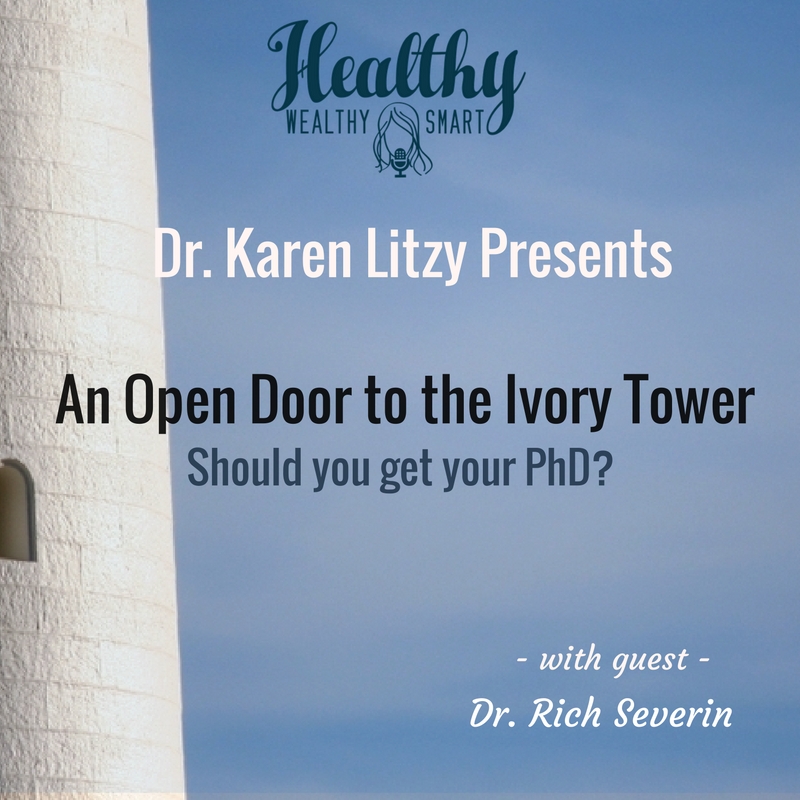Podcast: Play in new window | Download
On today’s episode, I had the pleasure of welcoming Dr. Richard Severin PT, DPT, CCS back onto the show to address audience questions on pursuing a terminal degree and entering the world of academia. Dr. Severin is a physical therapist currently pursuing his PhD in Rehab Science at the University of Illinois at Chicago with a focus in cardiovascular physiology.
In this episode, we discuss:
– What it takes to get accepted into the right PhD program for you including how to find a mentor and develop a competitive advantage
-Differences between each terminal degree and their job prospects
-Is it possible to manage DPT debt and clinical work while you pursue a PhD?
-The changing academic world and growth in the job landscape
-And so much more!
The ideal PhD program for you comes down to finding the right mentor. Dr. Severin’s advice is to, “Find someone who does research that you are interested in. The PhD really is mentor driven. Usually if you’re considering going down that road, you have a list of researchers or authors you follow—you kind of know who they are already. So that’s the first step, finding the person. If you have discourse with them, reach out to them. And if not, you’re not going to get a negative response from cold emailing and just say, ‘Hey, these are my interests, I would consider applying here, what are your opportunities?’”
Dr. Severin believes that the academic world is allowing for more entrepreneurial pursuits to support your income. He states, “You’ve got to eat what you kill. You’ve got to find ways to find revenue. Historically, patents weren’t something that contributed to rank and tenure and now they are starting to count. Social media is going to be a bigger thing now… Academia is starting to wisen up—which I think is good.”
Before applying to a PhD program, develop research experience to show that you can bring value. Dr. Severin recommends to, “Get a little bit of a taste of what it means to work in a lab before you commit yourself to 3 to 5 years of it. And that will look good on your application. There are usually 1 or 2 spots in most places, and if it’s a good lab with good researchers those are going to be very competitive spots. Sometimes even if it’s a smaller lab, funding is a scarce resource. It gives you a little bit of a taste, gives you an expectation of what you’re going to be doing, and it also shows you can do certain things. A lot of times it is what you can contribute to our lab, goes back to those scarce resources, they want to bring in people who are going to contribute.”
Dr. Severin is optimistic about the prospects of researchers and clinicians bridging together to validate clinical practice with evidence. “There is so much [data] out there that if we can find a way to harvest that data, process it, that’s going to be huge for us. When we talk about proving our worth, imagine if we could get all the outcomes from all of the PTs and find out what is going on here, we can really have some strong numbers that can combat different organizations or insurance companies who are trying to take away our reimbursements.”
For more about Dr. Severin:
 Dr. Severin is a physical therapist and ABPTS certified cardiovascular and pulmonary specialist. He completed his cardiopulmonary residency at the William S Middleton VA Medical Center/University of Wisconsin-Madison which he then followed up with an orthopedic residency at the University of Illinois at Chicago (UIC). Currently he is working on a PhD in Rehab Science at UIC with a focus in cardiovascular physiology. In addition to research, teaching and clinical practice regarding patients with cardiopulmonary diseases, Dr. Severin has a strong interest in developing clinical practice tools for risk assessments for physical therapists in a variety of practice settings. He is an active member within the APTA and serves on the social media committee and Heart Failure Clinical Practice guideline development team for the cardiopulmonary section.
Dr. Severin is a physical therapist and ABPTS certified cardiovascular and pulmonary specialist. He completed his cardiopulmonary residency at the William S Middleton VA Medical Center/University of Wisconsin-Madison which he then followed up with an orthopedic residency at the University of Illinois at Chicago (UIC). Currently he is working on a PhD in Rehab Science at UIC with a focus in cardiovascular physiology. In addition to research, teaching and clinical practice regarding patients with cardiopulmonary diseases, Dr. Severin has a strong interest in developing clinical practice tools for risk assessments for physical therapists in a variety of practice settings. He is an active member within the APTA and serves on the social media committee and Heart Failure Clinical Practice guideline development team for the cardiopulmonary section.
His research interests include: Assessment of cardiovascular risk in orthopedic physical therapy patients, hemodynamic responses to orthopedic rehab, Heart Failure, End Stage Lung Disease, Transplant Rehab, Exercise Physiology, Sport Performance, Peripheral muscle changes with cardiopulmonary and metabolic diseases, Tendinopathy
Resources discussed on this show:
UIC Integrative Physiology Laboratory Twitter
Clinical Rehabilitation and Technology Research Certificate
You can find more from Dr. Severin on twitter, facebook, and his website PT Reviewer!
Thanks for listening and subscribing to the podcast! Make sure to connect with me on twitter and facebook to stay updated on all of the latest! Show your support for the show by leaving a rating and review on iTunes!
Have a great week and stay Healthy Wealthy and Smart!
Xo Karen
P.S. Do you want to be a stand out podcast guest? Make sure to grab the tools from the FREE eBook on the home page! Check out my latest blog post on The Do’s and Don’ts of Social Media!


Trackbacks/Pingbacks